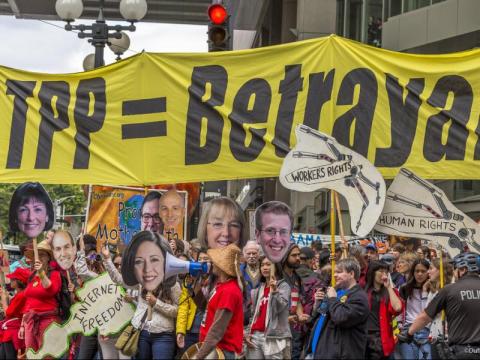
By Jack Bourassa, Regional Executive Vice President for the North
As published in the Yellowknifer, March 2016
For most of us Northerners, Free Trade Agreements (FTAs) don’t mean much. We’re busy worrying about the price of food, the health of our loved ones and our land, the security of our jobs (or lack thereof), and at best keeping up with local politics. And when FTAs are negotiated in secrecy, such as the Trans-Pacific Partnership (TPP), it makes it virtually impossible to understand their ramifications.
This time, we were kept in the dark on one of the largest free-trade agreements – one that dramatically impacts the areas that concern us most.
The ink is still fresh on this 12-country pact, as International Trade Minister Christy Freeland has just signed the TPP at the beginning of February in Auckland, New Zealand. The culmination of seven years of secret negotiations and corporate lobbying, the 5,000 page document was released to the public only three months before the actual signing ceremony – a legacy from our previous Conservative government.
The TPP – or what critics have accurately called ‘NAFTA on steroids” – is yet another deal that robs the people, while further entrenching the power of corporations. Let’s see what’s at stake.
Erosion of Canada’s sovereignty: FTAs are not limited to trade. Through a process termed Investor-State Dispute Settlement (ISDS), the TPP will allow corporations to challenge all levels of government decisions, such as enacting laws and regulations in the public interest around important issues like the environment, health care and public safety.
Job loss and income inequality: A TUFTS University study estimated a loss of 58,000 jobs in Canada as a result of the TPP, and increased income inequality. Other predictions mention that the auto industry alone could lose 20,000 jobs.
Weaker food safety regulations: the TPP allows for the importation of US dairy products, which could be tainted with Bovine Growth Hormone. It is illegal to administer this substance to cows in Canada, due to concerns for human and animal health.
Increased costs for medicine: The intellectual property chapter of the TPP may undermine efforts to control drug costs in Canada. New rules in the TPP would limit competition from generic drug manufacturers, which in turn will reduce access and increase drug prices.
Canada already has FTAs with four of the TPP signatory countries, and currently operates under no less than twelve trade agreements. Yet, our economy is shrinking, along with our currency. Renowned economists have already noted that the serious concerns raised by the TPP far outweigh the trade benefits. And since the feds have yet to conduct an economic impact study (perhaps because there are no serious benefits to be found), they are left without any solid reasoning to uphold the trade deal.
Besides, you don’t necessarily have to be an economist to conclude that FTAs are not the solution for unstable economies. Twenty years of NAFTA left Canada with the highest income inequality since the 1920s. Let us instead deliver the quality public services that Canadians need, and develop a robust manufacturing sector here at home, as promised during the 2015 federal election. A manufacturing sector that respects our land, our health, our workers and our sovereignty.
Where is the silver lining, you might wonder? For the TPP to come into effect, it must be ratified by each participating country. Given the negative implications for our democracy and our ability to protect the wellbeing of our communities, the TPP must be thoroughly analyzed and publicly consulted on – a dialogue that would include, first and foremost, the indigenous communities.
It is because we care about our health, our jobs, and our lands, that we need to take a stand and ensure we are kept in the dark no longer. Write to our MP, write to the Global Affairs Canada Department, and let them know that we are paying attention, and we say NO to the TPP.
Have your say:
TPP-PTP.consultations@international.gc.ca
Learn more:
https://www.policyalternatives.ca/newsroom/updates/stuart-trew-unpacks-t...
